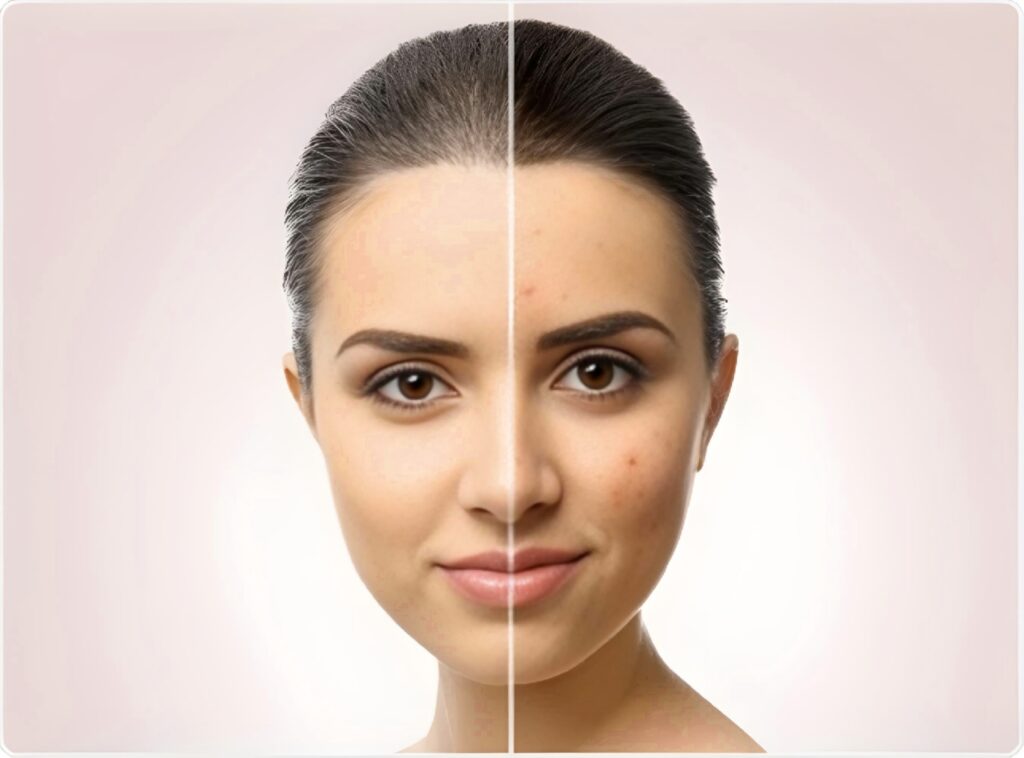In this Blog we will explore, What is acne?|Causes| Types and Symptoms| Treatment| Preventions |Clinical Care |Summery | What is Acne|
What is Acne?
Acne is a common skin condition that affects millions of people worldwide, particularly during adolescence. However, it can persist into adulthood, causing not only physical discomfort but also emotional distress. In this blog, we’ll explore the causes of acne, potential complications, and the various treatment options available to manage this condition.
Causes of Acne
Acne occurs when hair follicles become clogged with oil, dead skin cells, and bacteria. Several factors contribute to this process:
Hormonal Changes
During puberty, hormonal fluctuations lead to an increase in androgens, hormones that stimulate the sebaceous (oil) glands in the skin. The excess oil (sebum) can clog pores, leading to acne. Hormonal changes during pregnancy, menstrual cycles, and due to conditions like polycystic ovary syndrome (PCOS) can also trigger acne.
Excess Sebum Production
The sebaceous glands in the skin produce oil to keep it moisturized. However, overproduction of sebum can lead to clogged pores, creating an environment where acne-causing bacteria can thrive.
Bacteria
The bacteria Propionibacterium acnes (P. acnes) naturally reside on the skin. When pores become clogged, these bacteria multiply, leading to inflammation and the formation of pimples.
Clogged Pores
Dead skin cells that do not shed properly can mix with excess oil and clog hair follicles. This blockage can develop into blackheads, whiteheads, or pimples.
Genetics
A family history of acne increases the likelihood of developing it. Genetics can influence skin type, hormone levels, and how the skin responds to different factors.
Diet and Lifestyle
Certain foods, particularly those high in sugar and dairy, have been linked to acne outbreaks in some individuals. Stress can exacerbate acne by increasing hormone levels that stimulate oil production.
Medications
Certain medications, including corticosteroids, androgens, and lithium, can trigger or worsen acne.
Complications of Acne
While acne is primarily a cosmetic concern, it can lead to several complications, both physical and emotional:
Scarring
Severe acne, particularly cystic or nodular types, can lead to permanent scarring. Acne scars can be either hypertrophic (raised) or atrophic (depressed), affecting the skin’s texture and appearance.
Post-Inflammatory Hyperpigmentation (PIH)
After an acne lesion heals, it can leave behind dark spots, known as PIH. These spots are more common in individuals with darker skin tones and can take months to fade.
Emotional Distress
Acne can significantly impact self-esteem and confidence, leading to anxiety, depression, and social withdrawal. The psychological impact of acne is often underestimated but is an essential aspect of the condition that requires attention.
Infections
Picking or popping acne lesions can introduce bacteria into the skin, leading to secondary infections that may worsen the condition and increase the risk of scarring.
Treatments for Acne
The treatment of acne depends on its severity and the underlying causes. Here’s an overview of the most common treatment options:
Topical Treatments
Benzoyl Peroxide
An antimicrobial agent that kills acne-causing bacteria and helps reduce inflammation.
Retinoids
Derived from Vitamin A, topical retinoids like tretinoin and adapalene help unclog pores and prevent new acne from forming.
Salicylic Acid
This beta hydroxy acid (BHA) exfoliates the skin, helping to keep pores clear of dead skin cells.
Topical Antibiotics
These reduce the number of bacteria on the skin and help decrease inflammation.
Oral Medications
Antibiotics
Oral antibiotics like doxycycline and minocycline are prescribed for moderate to severe acne to reduce bacteria and inflammation.
Hormonal Treatments
For women, birth control pills or anti-androgens like spironolactone can help regulate hormones that trigger acne.
Isotretinoin (Accutane)
A powerful oral retinoid reserved for severe, cystic acne that has not responded to other treatments. It works by reducing oil production, shrinking sebaceous glands, and preventing clogged pores.
Procedural Treatments
Chemical Peels
A dermatologist applies a chemical solution to exfoliate the skin and improve the appearance of acne and PIH.
Laser and Light Therapies
These treatments target the deeper layers of the skin to reduce inflammation and kill acne-causing bacteria.
Extraction
In-office procedures where a dermatologist manually removes blackheads and whiteheads.
Home and Lifestyle Remedies
Skincare Routine
Using non-comedogenic (non-pore-clogging) products, cleansing the skin twice daily, and avoiding harsh scrubs can help manage acne.
Dietary Changes
Reducing intake of high-glycemic foods and dairy products may help some individuals manage their acne.
Stress Management
Practicing stress-reduction techniques like yoga, meditation, and regular exercise can positively impact acne.
Conclusion
Acne is a multifactorial condition that can significantly impact a person’s quality of life. Understanding the causes and potential complications is crucial for effective management. With the right combination of treatments, many people can achieve clearer skin and reduce the risk of long-term scarring and emotional distress. If you’re struggling with acne, it’s essential to consult a dermatologist to develop a personalized treatment plan tailored to your skin’s needs.

